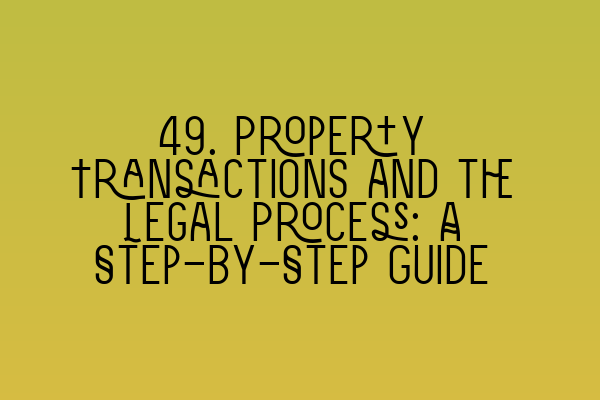Property Transactions and the Legal Process: A Step-by-Step Guide
At SQE Property Law & Land Law, we understand that navigating property transactions and the legal process can be quite daunting. Whether you are buying, selling, or transferring ownership, it is crucial to have a clear understanding of the steps involved to ensure a smooth and successful transaction.
In this comprehensive guide, we will take you through the step-by-step process of property transactions, providing you with valuable insights and tips to navigate each stage with confidence.
1. Preparing for the Transaction
Before embarking on any property transaction, it is essential to have a clear understanding of your objectives and requirements. Are you buying a new home or an investment property? Are you selling to upgrade or downsize? Once you have established your goals, it is time to prepare:
- Researching: Conduct thorough research on the property market, location, and any relevant regulations in the area.
- Seeking Financing: If necessary, secure your financing by approaching banks or mortgage lenders and determining your budget.
- Instructing a Solicitor: Engage a solicitor who specializes in property law to guide you through the legal aspects of the transaction.
- Conducting Surveys: Depending on the property’s condition, it may be prudent to arrange for surveys or valuations to identify any potential issues.
For more guidance on preparing for property transactions, check out our article on SQE 1 Practice Exam Questions.
2. Making an Offer and Negotiating
Once you have found the property of your choice, it is time to make an offer. Your solicitor will draft a letter of offer, outlining the price, terms, and conditions. The seller may accept, reject, or counter-offer. Negotiations may take place until both parties reach a mutually agreeable outcome. It is important to consult your solicitor throughout this process for legal advice and to ensure your interests are protected.
To enhance your negotiation skills, our article on SQE 1 Practice Mocks FLK1 FLK2 can provide valuable insights.
3. Conducting Legal Due Diligence
Before proceeding with the transaction, your solicitor will conduct legal due diligence on the property. This involves reviewing relevant documents, such as the title deed, survey reports, planning permissions, and any existing restrictions or encumbrances on the property. Your solicitor will identify and address any potential legal issues or discrepancies to ensure a smooth transfer of ownership.
4. Exchanging Contracts
Once both parties have agreed on the terms and conditions, and all legal due diligence has been completed, it is time to exchange contracts. This is a critical and binding stage of the transaction, where both the buyer and seller commit to completing the deal.
After the exchange, you are legally obligated to proceed with the purchase or sale. The completion date, when the property officially changes hands, will be agreed upon during the exchange. It is important to consult your solicitor for advice on appropriate contract terms and conditions to protect your interests.
For further information on exchanging contracts, our article on SQE 2 Preparation Courses can be a valuable resource.
5. Completion
The completion stage is when the property officially changes ownership. On the agreed completion date, both parties’ solicitors will arrange for the transfer of funds and the necessary legal documentation. Your solicitor will ensure that all necessary documents, such as the transfer deed and mortgage deed, are prepared and signed.
Once the completion process is finalized, you become the legal owner of the property, and the keys will be handed over accordingly.
Conclusion
Navigating property transactions and the legal process can be complex, but with the right knowledge and guidance, you can ensure a successful outcome. By following this step-by-step guide and seeking professional legal advice, you can navigate your property transaction with confidence.
For more information on property transactions and legal processes, take a look at our article on SQE 1 Preparation Courses.
Remember, it is crucial to engage an experienced solicitor who specializes in property law to guide you through each stage of the process and protect your interests.
If you have any further questions or need assistance with your property transaction, please do not hesitate to contact the expert team at SQE Property Law & Land Law.
For information on SRA SQE exam dates, please refer to our article on SRA SQE Exam Dates.
